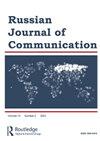The intelligentsia and emigration: strategic prospects, unrealized possibilities, and personal risks
Q1 Social Sciences
引用次数: 0
Abstract
As if in a bad movie, I had а recurring dream while working on this essay. In the dream, they’re getting ready to kick me out again. This time, for a different reason. Not because I’m a ‘relic of the Cold War,’ and therefore a stone in the government’s shoe. Now I’m going to be expelled for corrupting my audience with my liberal/democratic ideas. A man from Washington is expected to give a speech about it. There are rumors that this envoy of a new policy will demand that members of the ‘fake mass media,’ financed by the U.S. Congress, strive to instill the feeling of patriotism in their audience, along with moral values and spiritual moorings. I’m 70 now, not 57 as I was the last time, and the prospect of experiencing it again fills me with dread as I envision my rising from the ashes to which I am about to be reduced and beginning to push the stone up the hill all over again. My colleagues are outraged in private, but when I ask if they will stay silent like the last time, the instinct for self-preservation kicks in, as they hold up their hands in desperation: ‘You know how it is, what’s the point of peeing against the wind... ’ Perhaps the most depressing thing this time around was witnessing the intelligentsia abandoning its historical mission, morphing into the post-intelligentsia or specialists engaged in intellectual work. The so-called ‘professionals.’知识分子与移民:战略前景、未实现的可能性和个人风险
就像在一部糟糕的电影里一样,我在写这篇文章的时候做了一个反复出现的梦。在梦里,他们又准备把我赶出去了。这一次,原因不同。不是因为我是“冷战的遗物”,因此是政府的绊脚石。现在我要被开除了,因为我的自由/民主思想腐蚀了我的听众。一位来自华盛顿的男士将就此发表演讲。有传言说,这位新政策的使者将要求美国国会资助的“虚假大众媒体”成员努力向听众灌输爱国主义意识,以及道德价值观和精神支柱。我现在已经70岁了,而不是上次的57岁了。当我想象着自己即将从灰烬中重生,开始把石头再一次推到山上时,再次经历这一切的前景让我充满了恐惧。我的同事们私下里很愤怒,但当我问他们是否会像上次一样保持沉默时,自我保护的本能开始发挥作用,他们绝望地举起双手:“你知道这是怎么回事,对着风撒尿有什么意义……也许这一次最令人沮丧的事情是目睹知识分子放弃其历史使命,变成后知识分子或从事知识工作的专家。所谓的“专业人士”。
本文章由计算机程序翻译,如有差异,请以英文原文为准。
求助全文
约1分钟内获得全文
求助全文
来源期刊

Russian Journal of Communication
Social Sciences-Political Science and International Relations
自引率
0.00%
发文量
0
期刊介绍:
Russian Journal of Communication (RJC) is an international peer-reviewed academic publication devoted to studies of communication in, with, and about Russia and Russian-speaking communities around the world. RJC welcomes both humanistic and social scientific scholarly approaches to communication, which is broadly construed to include mediated information as well as face-to-face interactions. RJC seeks papers and book reviews on topics including philosophy of communication, traditional and new media, film, literature, rhetoric, journalism, information-communication technologies, cultural practices, organizational and group dynamics, interpersonal communication, communication in instructional contexts, advertising, public relations, political campaigns, legal proceedings, environmental and health matters, and communication policy.
 求助内容:
求助内容: 应助结果提醒方式:
应助结果提醒方式:


